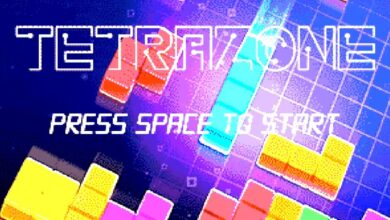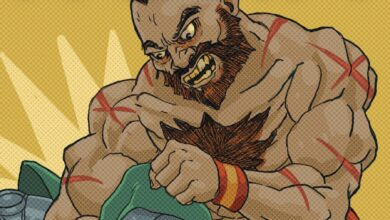Retro Re-release Roundup, week of May 11, 2023

Kingdom of Tears.
The undisputed release of this week, and possibly the decade, is Dokapon Kingdom Connect, a remaster of Sting’s ultra-antagonistic RPG party game that offers both welcome enhancements (online multiplayer!) and inexplicable, far-reaching changes to the overall meta (ie the power dynamic is radically different if you can’t physically berate your friends for screwing you over).
ARCADE ARCHIVES
Mazinger Z
- Platform: PlayStation 4, Nintendo Switch (worldwide)
- Price: $7.99 / €14.99 / £11.99
- Publisher: Hamster / Banpresto
What’s this? A vertically-scrolling shooting game adaptation of Go Nagai’s classic super robot series Mazinger Z, originally distributed in Japanese arcades by Banpresto in 1994 and never reissued until today; one or two players can pilot either the Mazinger, Great Mazinger or Grendizer as they shoot, bomb and punch their way through the minions of Dr. Hell and the Underground Empire. (The full development history of this game is somewhat murky but it was, for a time, being developed by shooting game fanatics Raizing, and the game bears many audiovisual similarities to their vertical shooter Mahou Daisakusen.)
Why should I care? Liberties with the robot sizes aside, this game’s packed with Mazinger fanservice, including several voice clips and quite a few renditions of classic tunes from the anime, and it’s a perfectly well-constructed shooting game besides, with a bullet-cancelling melee punch that helps make it a much more approachable game than many of its contemporaries. Moreover, this is the first big character-licensed Arcade Archives release and one that opens the door for home ports of a multitude of licensed arcade games that were previously thought to be off-limits. (Note that this game is more expensive than the typical ACA release: if you want these big character games, you’re gonna have to pay extra for ’em.)
Helpful tip: It’s quite possible to counter-stop this game, so the Arcade Archives version offers the option to add an extra digit to the score counter.
G-MODE ARCHIVES+
Tantei Kibukawa Ryousuke Jiken-tan Vol.11: Ane no Kabe
- Platform: PC via Steam (worldwide)
- Price: $7.99 or equivalent
- Publisher: G-MODE / And Joy
What’s this: Kibukawa Ryousuke detective adventure the eleventh, originally released for Japanese feature phones by And Joy in the mid-’00s;the detectives visit a village to investigate a local legend about a girl who disappeared after building a wall to protect the people from a malevolent serpent, but as it turns out, her disappearance may not have been a self-sacrifice…
Why should I care? I’m multiple games behind, dudes. Sorry.
Helpful tip: I’ve mentioned this a few times recently and I figure it’s worth repeating: this series was originally written and shepherded by Takanari Ishiyama, writer/producer of Square-Enix’s recent surprise-hit adventure game Paranormasight, and it seems like the success of G-MODE’s Kibukawa reissues played no small part in its success, at least in Japan. That said, Ishiyama tapped out of the series after ten volumes, so this volume and all subsequent volumes were written by different folk (and it seems G-MODE’s implied they’ll be reissuing every last one of ’em).
Psycho Mystery Series vol.1: THREE ~Mittsu no Kioku~ The Mystery Maze
- Platform: Nintendo Switch (Japan)
- Price: ¥800
- Publisher: G-MODE / And Joy
What’s this? The first entry in Genki/And-Joy’s Psycho Mystery series of paranormal mystery adventure games, which spanned roughly a dozen volumes, as well as radio dramas and e-books, from 2005 to 2007; This first volume follows the story of Hideaki Seta, a high-school student with short-term memory issues who seems to have murdered his girlfriendl Hideaki can only retain three recent memories at a time, so the player has to use those memories to work backwards via conversations with friends and witness to attempt to discover the truth.
Why should I care? My very limited understanding of this series is that it was largely popular off the back of a pair of protagonists who were introduced in the second game and whose relationship developed over subsequent volumes… but they’re not in this one, so hell if I know how people rate this one. I mean, it sounds neat.
Useless fact: Each volume in this series is loosely themed around some ancient cultural text, and in this case, it’s the story of the Tree of Life from the Book of Genesis.
OTHER
Dokapon Kingdom: Connect
- Platform: Nintendo Switch (worldwide)
- Price: $49.99 or equivalent
- Publisher: Idea Factory / Sting
What’re these? A remaster of Sting’s “friendship-destroying” Nintendo Wii RPG/board game Dokapon Kingdom, originally released on 2008 in Japan and North America and 2010 in PAL territories, which itself was a remake of a 1994 Super Famicom game; this new version largely recreates the Wii version in a faithful manner, save for new 2D character illustrations, with the big addition being online multiplayer, which offers generous auto-saves, an instant lobby regroup in the case of player dropouts and the option to assign or deassign player-characters to CPU control where necessary, with three players able to go online from a single Switch.
Why should I care? Where other nominally simiilar games might have players competing and strategizing around transactional pursuits like real estate acquisition, with random events treated as indifferent acts of luck, every battle, quest, event and choice in Dokapon Kingdom has been specifically engineered to ensure players empower themselves at the direct expense of their rivals, often in the pettiest manner possible, so if you and your pals have a couple dozen hours to spare and an appetite for extreme dickishness, you’re bound to thoroughly enjoy at least one full game, and quite likely absolutely no more than that. (This is a game you’ll absolutely need to play with other human players, as the AI cheats openly and relentlessly.)
Useless fact: The Wii release of Dokapon Kingdom launched alongside Dokapon Journey for DS, which many took to be a handheld adaptation of the Wii game, but that wasn’t the case: Dokapon Journey is a remake of the very first game (Dokapon IV) whereas Dokapon Kingdom is a remake of the sequel (Dokapon 321) and as such, the DS version isn’t quite as deep or varied as the Wii game, so if you didn’t quite gel with the handheld game back in the day, give Kingdom a shot.
I MISSED THIS LAST WEEK AND I DESERVE YOUR SCORN
Kid Chaos
- Platform: PC via Steam (worldwide)
- Price: $49.99 or equivalent
- Publisher: Pixel Games UK / Magnetic Fields
What’s this? A Sonic clone, that’s what — it originally hit the Commodore Amiga and Amiga CD32 in 1994, courtesy of Lotus series developer Magnetic Fields and Ocean Software, and is now available in PC in emulated form, sporting save states, screen filters, controller configs and the ability to choose between either version of the game, not that they differ a whole lot.
Why should I care? Sonic clones have traditionally either not Got It to an embarrassing degree, or majorly diverge from the core tenets of Sonic to the extent that it’s hard to see them as majorly derivative, but Kid Chaos is just close enough to Getting It that its many flaws are intriguing rather than infuriating — it’s not good, but it conceivably could be, and that’s certainly not true of most of the games of its ilk.
Helpful tip: The well-received Zool remaster’s coming to PS4 in a few days, if you’d rather hold out for the premier Euro not-Sonic.





